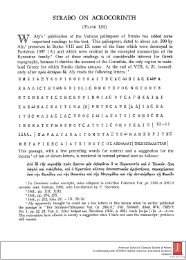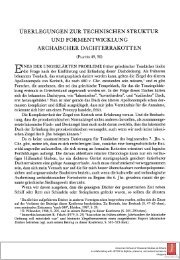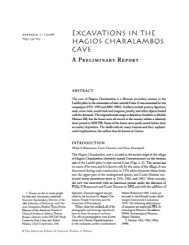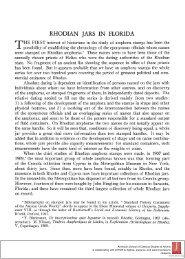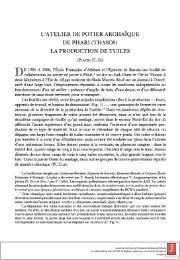the attic stelai - The American School of Classical Studies at Athens
the attic stelai - The American School of Classical Studies at Athens
the attic stelai - The American School of Classical Studies at Athens
Create successful ePaper yourself
Turn your PDF publications into a flip-book with our unique Google optimized e-Paper software.
210 W. KENDRICK PRITCHETT<br />
<strong>of</strong> <strong>the</strong> public<strong>at</strong>ions <strong>of</strong> <strong>the</strong>se two scholars contain numerous references to <strong>the</strong> ceramic<br />
liter<strong>at</strong>ure. On <strong>the</strong> Par<strong>the</strong>non frieze, Eros holds a parasol to protect Aphrodite.<br />
III. FURNITURE<br />
Our record <strong>of</strong> <strong>the</strong> sale <strong>of</strong> confisc<strong>at</strong>ed furniture seems to show th<strong>at</strong> <strong>the</strong>re was<br />
little sense <strong>of</strong> personal luxury in A<strong>the</strong>ns in <strong>the</strong> last quarter <strong>of</strong> <strong>the</strong> fifth century, even<br />
among men <strong>of</strong> wealth. Doubtless <strong>the</strong> couches, chairs, and tables listed had <strong>the</strong> same<br />
elegant lines as <strong>the</strong> furniture pictured on vases and in reliefs, but <strong>the</strong>re is no least<br />
suggestion <strong>of</strong> <strong>the</strong> l<strong>at</strong>er kind <strong>of</strong> lavishness which brought Cicero, for instance, to pay<br />
12,000,000 sesterces for a table <strong>of</strong> rare citrus wood. Greek furniture makers knew<br />
how to make pieces th<strong>at</strong> were costly as well as beautiful, but such elabor<strong>at</strong>e products<br />
were not intended for priv<strong>at</strong>e use. Stools <strong>of</strong> ebony, couches inlaid with ivory, chests<br />
<strong>of</strong> rare woods, tables with golden legs, and o<strong>the</strong>rs covered with silver, are carefully<br />
listed as such in <strong>the</strong> temple inventories <strong>of</strong> A<strong>the</strong>ns, Eleusis and Delos, but <strong>the</strong> furniture<br />
from <strong>the</strong> houses <strong>of</strong> <strong>the</strong> companions <strong>of</strong> Alkibiades was for <strong>the</strong> most part made simply<br />
<strong>of</strong> wood. A few decades l<strong>at</strong>er Lysias, in arguing th<strong>at</strong> Aristophanes had lived modestly,<br />
maintained th<strong>at</strong> <strong>the</strong> wealth <strong>of</strong> prominent men was always being overestim<strong>at</strong>ed by <strong>the</strong><br />
people; Aristophanes, he said, had had to borrow table vessels when he entertained<br />
important guests, and in truth, many <strong>of</strong> <strong>the</strong> represent<strong>at</strong>ives <strong>of</strong> <strong>the</strong> old rich families<br />
could make no show <strong>at</strong> all in <strong>the</strong> way <strong>of</strong> furniture.1 Though <strong>the</strong>y may be exagger<strong>at</strong>ed,<br />
Lysias' remarks reflect a kind <strong>of</strong> distaste for any exhibit <strong>of</strong> priv<strong>at</strong>e wealth, a distaste<br />
which must have been prevalent enough <strong>at</strong> <strong>the</strong> close <strong>of</strong> <strong>the</strong> Periclean age to influence<br />
even <strong>the</strong> circle <strong>of</strong> Alkibiades in its manner <strong>of</strong> living.2 Indeed, it is possible th<strong>at</strong> <strong>the</strong>se<br />
young men went fur<strong>the</strong>r than most, and affected certain " Spartan " simplicities.<br />
Even for plain furniture <strong>the</strong> prices listed in <strong>the</strong> Attic Stelai are remarkably low.<br />
When <strong>the</strong> property <strong>of</strong> Aristophanes was sold, th<strong>at</strong> same household equipment which<br />
had had to be pieced out with loans from friends brought 1000 drachmas; 'presumably<br />
this included <strong>the</strong> furniture, dishes and utensils (but not <strong>the</strong> doors, which had been<br />
stolen) <strong>of</strong> a fairly typical A<strong>the</strong>nian town house belonging to a man <strong>of</strong> some prominence.<br />
Yet if we use <strong>the</strong> furniture prices found in our list and mentally furnish such<br />
a house, it is almost impossible to reach a total expenditure much over 500 drachmas.<br />
Does this really mean th<strong>at</strong> <strong>the</strong> friends <strong>of</strong> Alkibiades lived about as rudely as <strong>the</strong><br />
Naxian farmer whose furniture, according to a mortgage stone <strong>of</strong> ca. 300 B.C., secured<br />
500 drachmas <strong>of</strong> dowry? ' Probably not; ra<strong>the</strong>r, <strong>the</strong> low prices should be considered as<br />
ILysias, XIX, Property <strong>of</strong> Aristophanes, 30.<br />
2<br />
It is tempting to try to draw some conclusion from a fragment <strong>of</strong> Eupolis' Poleis, where household<br />
equipment is listed, but <strong>the</strong>re is no knowing whe<strong>the</strong>r this c<strong>at</strong>alogue was supposed to apply<br />
to a poor or rich, country or city, house (frag. 228: Kock, C.A.F., I, p. 320).<br />
3 Lysias, XIX, 31.<br />
4I.G., XII, Suppl., 195; see Finley, <strong>Studies</strong> in Land and Credit in Ancient A<strong>the</strong>ns, New





